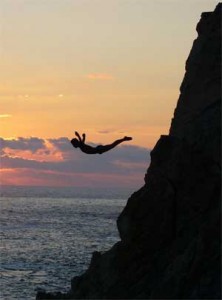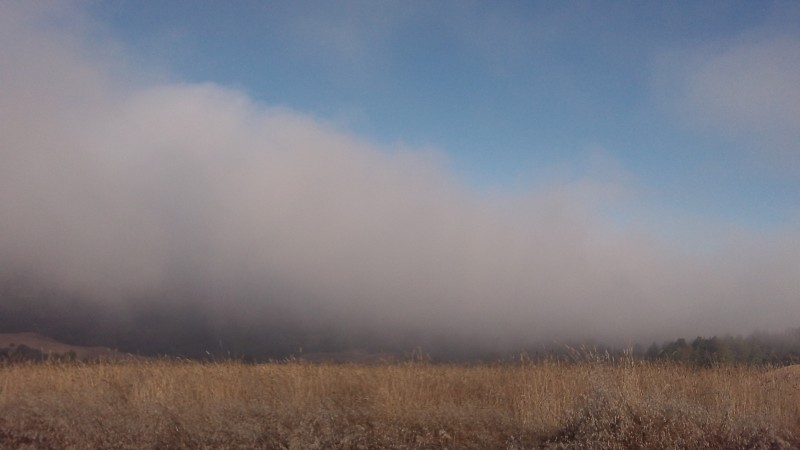 I am in a large group of women artists who have driven up to the ridge of a mountain range and then down a very windy road to a secluded artists retreat program in northern California. All I want to do is stare at the dreamy landscape, watching how the golden green hills go back and back and back, disappearing finally into a fog bank which hovers just above the sea in the distance. I want to watch as the wind blows, the fog clears, and the misty outlines of the hilltops begin to glisten in the midday sunlight. I want to sit and sketch it, and fill in the colors I am seeing, and try to capture the dreaminess, the haziness of it all, the lack of precise outlines which gives it that quality of mystery that makes me want to keep staring.
I am in a large group of women artists who have driven up to the ridge of a mountain range and then down a very windy road to a secluded artists retreat program in northern California. All I want to do is stare at the dreamy landscape, watching how the golden green hills go back and back and back, disappearing finally into a fog bank which hovers just above the sea in the distance. I want to watch as the wind blows, the fog clears, and the misty outlines of the hilltops begin to glisten in the midday sunlight. I want to sit and sketch it, and fill in the colors I am seeing, and try to capture the dreaminess, the haziness of it all, the lack of precise outlines which gives it that quality of mystery that makes me want to keep staring.
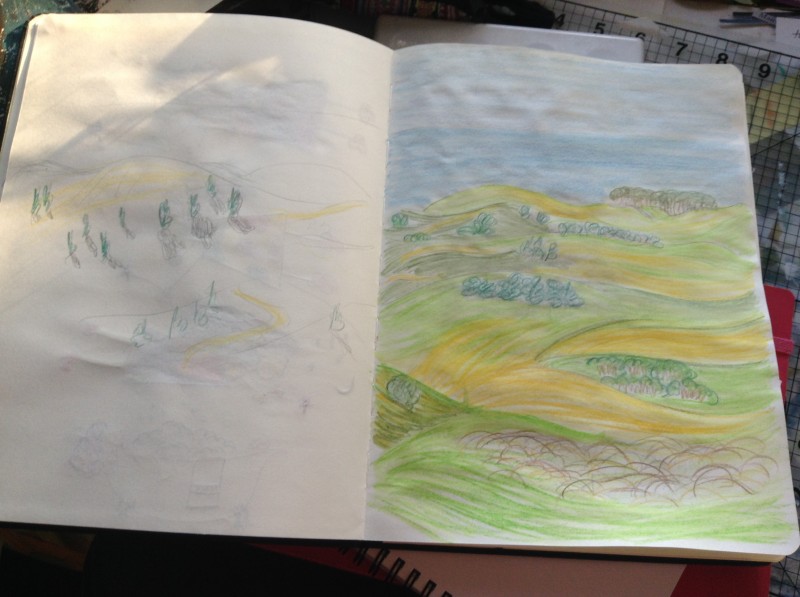
But we have a schedule. There are ranchers and herders moving us along in this schedule, ensuring that we are on time. I help myself to a large lunch - two servings each of lentil soup and kale salad with some fruit on the side. My idea of a perfect meal. But my stomach feels slightly full after all that, and I am ready to rest and digest.
Having forgotten the schedule momentarily, I’m jarred when it is announced that we now need to move into another room for a “movement activity”.
I take my time walking there, hoping those extra few seconds will give my digestive system time to bring the food down a little more.
By the time I join, the circle has been formed and all the women are bouncing lightly on their bare or socked feet. This being one of only 14% of artist residency programs in the country who have a fully spring loaded dance floor, shoes are not allowed.
Ann Swanberg is the leader. I had experienced her work once before in a large church, where she presented her improvisational approach to life in a humorous show. We kept bouncing - this was Ann’s method for keeping us out of our thinking minds and in some other realm governed by the moving, breathing body - and we did a whole host of games designed to get us to drop our personalities by acting silly and free.
What I noticed is that my recent experiences with becoming present were done in the stillness and silent meditative movement of the Breema Center. Somehow in that setting, where I was truly not a personality and there was absolutely no imperative to show up as entertaining in any way, I could feel my own bodily presence. In this setting where everyone was asked to do something silly, there was slight pressure to be “silly enough”. As if stillness would not have been accepted there. But I don’t know because I just flowed with the energy of the room.
One of the more silent and inward-turning exercises of the day did capture my attention. She called it “The Infinity Box” or “Loving It ‘Til You Know What It Is”. The instructions went something like this: Reaching into an imaginary box from which anything is possible, allowing the “Body First” to lead the improvisation, follow the shape your hands spontaneously take as you reach in. As they emerge from the imaginary box, just be with them. Don’t change them or manipulate them into what you think they might be. Just breathe with the shape, feel it.
"Love it ’til you know what it is."
It was fascinating to watch the different shapes my hands took on when I allowed them to. Fingers apart and curved, palms facing up. Fingers together, joined at the thumbs and index fingers. Palms cupped, joined together, facing up. And then waiting. Breathing. Feeling. An answer or image always emerged. But sometimes I had to stay with it longer than expected. The final one I ran out of time on. So I sketched it, and it is permanently imprinted in my bodily memory. I am still wondering what it is.
It reminded me of painting. How the creative practice for me is staying with something long enough to find out what it is. Not to give up. Not to decide in advance that something’s “never going to work”. So often when I have mustered the courage or audacity or love to stay with it, to keep going, to keep loving it, something else so beautiful and magical emerges right on top of it all.
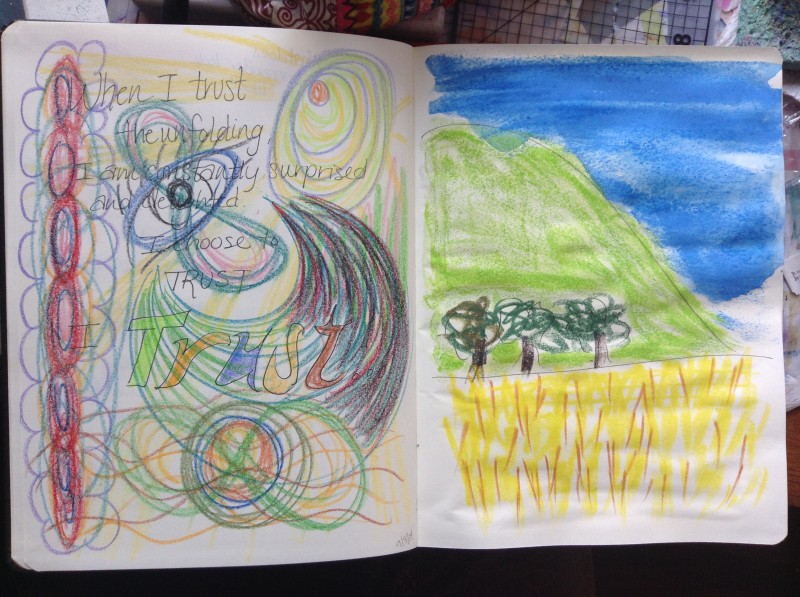
Chris Zydel sent out her newsletter yesterday too, and I happened to read all the way to the bottom. The article was about "Surrender". How surrender is not giving up or weakness or defeat. But rather a form of full presence. That in order to fully participate, there is surrender involved. As I write this, it occurs to me that the four “No…” principles from Breema touch on what kinds of surrender are involved - No Judgment, No Force, No Extra, No Hurry No Pause. Well that’s a lot to give up in order to get to presence! How often are we drowning in judgment, doing more than is needed, rushing around, or not acting because we feel stuck in hesitation.
Surrender is the sweetness of letting life lead. Of loving whatever life gives you until you know what it is. I am attempting to apply it to my body, my relationships, my work decisions, all of which I apply a certain amount of control, changing, and fixing to. I don’t really know the state of full surrender into acceptance. I am pointing towards it sometimes, but I haven’t sunk to the depths of that pool to say, “Huh. So this is it. I’d like to know how this feels. Really.”
Here’s what Chris had to say about surrender:
When a sunflower turns its face to follow the sun, that is surrender. When a seed planted in a rich soil breaks free of its encasement and pushes its way up to the light of day, that is surrender. When a wild mustang gallops wildly and joyfully across a meadow, that is surrender. When a baby tries to grasp a beam of light, laughing delightedly, that is surrender. When you look at a sunset and feel the peace of simply breathing in and out, that is surrender. When you enjoy a delicious meal, letting the flavors tickle your tongue, that is surrender. When you feel drowsy and begin to fall asleep, that is surrender.
In all these experiences you, or the horse or the sunflower are completely giving into what's right there in front of you. You are simply being in the present moment with what you feel drawn to do.
So in other words, surrender is something that happens daily, hourly, minute by minute in our lives. It's so very common and down-to-earth. It's in the most intimate fabric of our existence. And includes everything from the mundane to the ecstatic.
And tomorrow, with the start of the final Energy Gardeners' Club of the year, I am ready to apply the principle of Surrender. Making things happen is not about controlling in order to get what you want. Making is allowing.
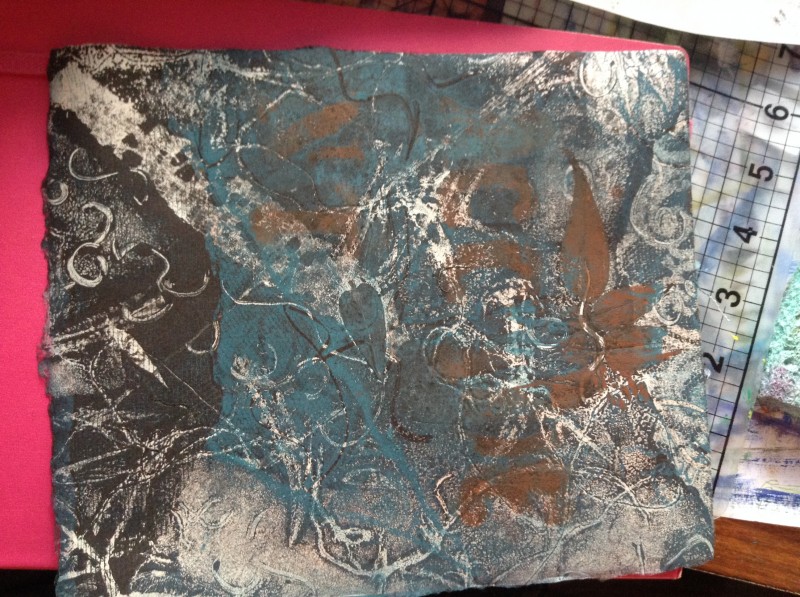
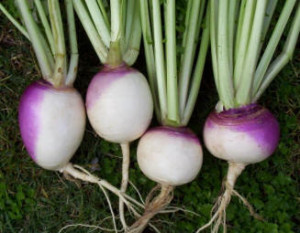
 There's going to be some talk about
There's going to be some talk about 